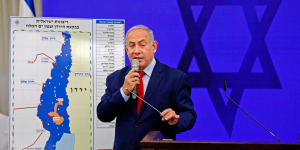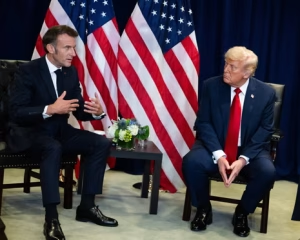Washington D.C. – US President Donald Trump has delivered an unequivocal statement opposing any potential Israel West Bank annexation, declaring he will not permit such a move despite Israeli government suggestions about seizing control of the occupied territory. This firm stance marks a significant moment in US-Israel relations and addresses concerns raised by Arab leaders throughout the Middle East.
Trump’s blunt response came during an executive order signing in the Oval Office on Thursday when asked about recent Israeli official statements suggesting their government could pursue Israel West Bank annexation. “I will not allow Israel to annex the West Bank. I will not allow it. It’s not going to happen,” the President told reporters, leaving no ambiguity about his position.
Netanyahu Conversation and Firm Presidential Stance


The President revealed he had spoken directly with Israeli Prime Minister Benjamin Netanyahu regarding the potential Israel West Bank annexation plans. Despite Trump’s long-standing claims about his close relationship with Netanyahu, he emphasized his determination to prevent annexation, stating, “It’s been enough. It’s time to stop now.”
This firm presidential position on Israel West Bank annexation comes as Netanyahu leads what historians describe as Israel’s most nationalist government in history. The Prime Minister faces substantial pressure from key coalition allies to deepen Israeli control over the occupied territory, with many hoping Trump’s historical support for Israeli policies would facilitate expanded territorial control.
Arab Leaders’ Red Line and Regional Concerns
Trump’s opposition to Israel West Bank annexation aligns with consistent warnings from Arab leaders who have publicly expressed serious concerns about such territorial expansion. The United Arab Emirates has specifically warned that any Israel West Bank annexation would constitute a “red line,” signaling potential diplomatic consequences for such action.
Also Read: Shocking Trump New Tariffs Target Trucks, Drugs and Cabinets
The President’s statement appears responsive to sustained pressure from regional Arab partners who view potential Israel West Bank annexation as destabilizing to Middle East peace efforts. These concerns have intensified amid recent Israeli government discussions about asserting greater control over occupied territories.
Historical Context and Territorial Disputes


The Israel West Bank annexation debate exists within complex historical circumstances dating to the 1967 Mideast war, when Israel captured the West Bank, East Jerusalem, and Gaza Strip. Palestinians seek all three territories for their future independent state, while Israel’s current government staunchly opposes Palestinian statehood and supports eventual annexation of substantial West Bank portions.
Unlike Gaza, where Israel’s war with Hamas continues, the West Bank is administered by the Palestinian Authority, creating different political and administrative dynamics regarding potential Israel West Bank annexation scenarios.
Settlement Reality and International Law

More than half a million Jewish settlers now live in the West Bank across approximately 130 settlements, creating facts on the ground that complicate any Israel West Bank annexation discussions. The international community largely views these settlements as illegal and significant obstacles to peace, though Israeli governments have continued supporting settlement expansion.
The settlement presence has made the Israel West Bank annexation question increasingly urgent, with nationalist Israeli coalition members arguing that extensive Jewish population presence justifies formal territorial incorporation.
International Recognition of Palestinian Statehood
Recent Israeli government suggestions about potential Israel West Bank annexation emerged partly as response to multiple countries recognizing Palestinian statehood. Approximately 10 countries, including Britain, France, Canada, and Australia, recognized Palestinian statehood this week, hoping to revive the long-moribund peace process.
These recognition decisions, which the United States and Israel have vehemently rejected, appear to have prompted Israeli discussions about accelerating Israel West Bank annexation plans. However, Trump’s firm opposition now blocks this potential response strategy.
Western Outrage and Military Export Restrictions
Western countries have expressed outrage over Israel’s intensifying Gaza offensive, with several responding through Palestinian statehood recognition and other diplomatic measures. Germany, one of Israel’s closest allies, has not joined ceasefire calls or Palestinian statehood recognition but has halted some military exports, indicating growing international concern about Israeli policies.
This broader context of Western frustration with Israeli military actions has influenced the debate surrounding potential Israel West Bank annexation, with many viewing such territorial expansion as further destabilizing.
Implications for US-Israel Relations


Trump’s categorical rejection of Israel West Bank annexation represents a notable moment in US-Israel relations, particularly given the President’s historically strong support for Israeli positions. This stance demonstrates limits to American backing even under an administration generally favorable to Israeli security concerns.
The President’s willingness to directly oppose Netanyahu on Israel West Bank annexation suggests recognition that such territorial expansion would create unsustainable diplomatic consequences, both regionally and internationally.
Future of Peace Process and Territorial Status

Trump’s opposition to Israel West Bank annexation leaves the territory’s long-term status unresolved while preventing immediate territorial expansion. The statement may encourage renewed peace process discussions, though fundamental disagreements between Israeli and Palestinian positions remain substantial obstacles.
The clear presidential position against Israel West Bank annexation establishes definitive American opposition that Netanyahu’s nationalist coalition must now navigate as they face continued pressure from settlement advocates and coalition partners demanding greater territorial control over occupied Palestinian lands.

